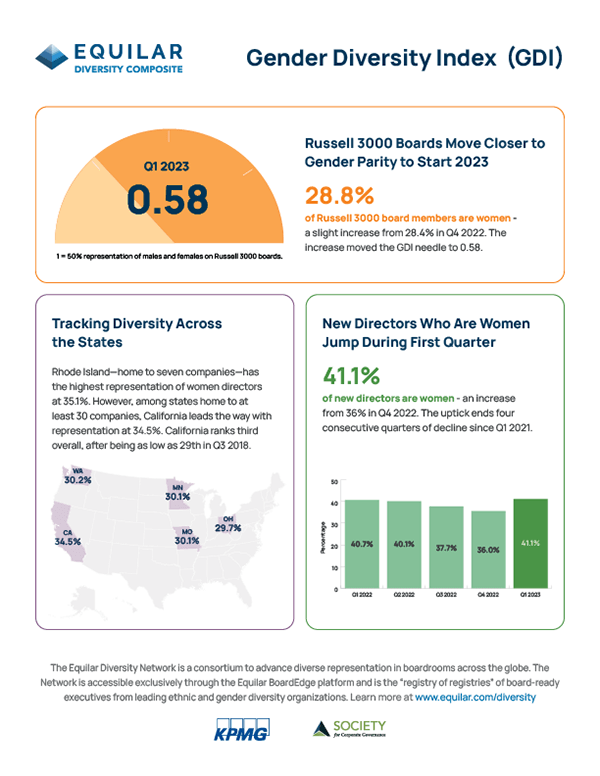Q1 2023 Equilar Gender Diversity Index
California and Washington Lead the Way With the Highest Representation of Women on Boards
May 11, 2023
Amit Batish
The conversation around DEI has steadily become more frequent and louder across corporate America in recent years. Companies have made it a priority to address DEI-related issues to foster a more inclusive work environment. In response, diversity, or lack thereof, at the top of organizations has captured the attention of key investors and stakeholders. Notably, bolstering gender diversity has remained a critical priority for public company boards for quite some time.
Despite the regular spotlight on the gender diversity of corporate boards, progress has been relatively slow. According to the Q1 2023 Equilar Gender Diversity Index (GDI)—featured in coverage from The Wall Street Journal—women now represent 28.8% of all Russell 3000 board seats, which is up 1.5% from 28.4% in Q4 2022. While the growth is small, it is the largest increase since Q2 2022. The uptick during Q1 2023 pushed the GDI needle to 0.58, where 1.0 represents gender parity.

Research from the latest GDI reveals that most companies have between 20% to 39% representation of women on boards, with 67.5% of Russell 3000 boards falling in this range. Meanwhile, 14.4% of companies have between 10% to 19% of their board seats occupied by women—the next most common range.

Several milestones were observed in Q1 2023. During the first quarter of the year, the number of boards with at least 50% women increased from 138 to 147, following no change in the previous quarter. Additionally, the analysis shows that three companies have achieved at least 80% female representation: Olaplex Holdings, Tootsie Roll Industries and Victoria’s Secret.
While no Russell 3000 company has achieved 100% representation, Aspira Women’s Health—a non-Russell 3000 company that focuses on gynecological health diagnostics and solutions for women—is entering uncharted territory. Aspira recently became the first public company to have an all-women board. Experts have argued for years that a company’s board of directors should represent the consumers of the products or services that it sells, and this is certainly the case for Aspira considering its target audience.
“Ideally, boards will have a composition and culture that supports robust discussion of strategy and risk from the perspective of multiple lenses,” said Susan Angele, Senior Advisor, Board Governance at The KPMG Board Leadership Center. “For consumer-facing companies, board demographics that reflect the company’s consumer base can help add tremendous value and insight.”
Nevertheless, the glacial pace of growth of women on Russell 3000 boards can be attributed to several different factors. For one, during the entirety of 2022, the percentage of newly appointed board members who are women declined each quarter, ending the year at just 36%. In fact, Q3 2022 was the first quarter since Q2 2020 that under 40% of newly appointed directors were women. However, the trend shifted during the first quarter of 2023 as 41.1% of new Russell 3000 board members were women.
“It’s great to see that the percentage of women joining boards is ticking up after it had dropped a bit,” said Angele. “It’s not surprising as we continue to see strong investor interest in board diversity.”

Of course, other factors have played a part in the deceleration of progress in the last year. Many companies have expanded their definition of "diverse" to take into account race, ethnicity, sexual orientation and other forms of diversity beyond just gender. Diverse gender representation remains a priority; however, companies are seeking to add a variety of other diverse perspectives to their boardrooms, potentially slowing down progress on the gender diversity front. On the other hand, the focus on other forms of diversity could open the gates to new opportunities for women. “Given the important focus on racial and ethnic diversity, we would hope to see a strong showing by women of color,” said Angele.
Meanwhile, legislative efforts in states like California were crucial in boosting diversity efforts. When California Senate Bill 826—legislation that required all public company boards headquartered in the state to have at least one woman—passed in 2018, California ranked just 29th in the U.S. in female board representation with 17.4% of board members being women. Fast forward to today, California now ranks third in the nation at 34.5% representation. Despite the impacts of SB 826, a California judge ruled the law to be unconstitutional in 2022, potentially setting back progress in one of the largest states in the country. Washington is the only other state in the U.S. to put forth legislation that mandates boards to include women. The state of Washington currently ranks 10th among states, with 30.2% of board seats held by women as of Q1 2023—down from ninth at 30.3% a year ago.

Rhode Island currently ranks first among all U.S. states with 35.1% of its board members being women. However, the state is home to just seven companies. Among all states home to at least 30 companies, California (34.5%) and Washington (30.2%) have the highest representation of women on boards, followed by Missouri (30.1%), Minnesota (30.1%) and Ohio (29.7%).
Representation of Women on Boards by State
The push for diversity on boards will certainly grow stronger each quarter. The findings from the latest GDI show that, while progress is slow, many companies are continuing to make an effort to add highly qualified women to their boards. As calls from investors and advocates to diversify boards grow louder, gender parity may not be too distant in the future.
About Equilar Gender Diversity Index
The Equilar GDI reflects changes on Russell 3000 boards on a quarterly basis as cited in 8-K filings to the SEC. Most indices that track information about board diversity do so annually or even less frequently, and typically with a smaller sample size, sometimes looking back more than a full year by the time the information is published. While this data is reliable and accurate, the Equilar GDI aims to capture the influence of the increasing calls for diversity from investors and other stakeholders in real time.
The Equilar GDI is powered by Equilar BoardEdge, a database of more than one million public company board members and executives. BoardEdge includes exclusive features that show how board members and companies are connected to each other, as well as the Equilar Diversity Network (EDN), a “registry of registries” of board-ready executives from leading ethnic and gender diversity partnerships, organizations, and publications.
Contact

Amit Batish
Senior Director of Content at Equilar
Amit Batish, Senior Director of Content at Equilar, authored this post. Equilar Researchers Ryan Cody, Seth Mutenda, Forrest Rouleau, Kelly Stangl, Lexie Tang and Laura Wu contributed data and analysis. Please contact Amit Batish at abatish@equilar.com for more information about this article.
 Solutions
Solutions















